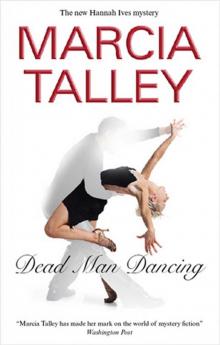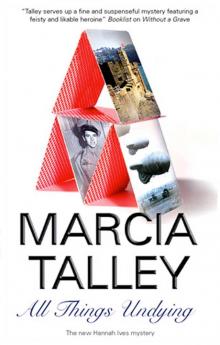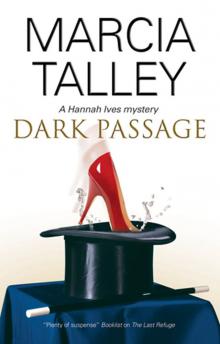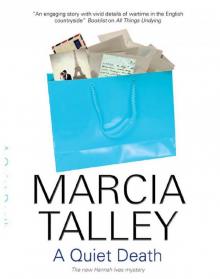- Home
- Marcia Talley
This Enemy Town Page 4
This Enemy Town Read online
Page 4
“Holy cow,” I said at last.
Emma reached for her notebook and extracted a postcard from between the pages. “Here’s a picture of her,” she said, handing the postcard to me across the table.
The USS Bonhomme Richard, LHD6, had a nickname, I learned: the Revolutionary Gator. And Emma was right; it did resemble an aircraft carrier, with airplanes lashed, like children’s toys, to the deck. Unlike an aircraft carrier, though, amphibious vessels could drive home, straight into the gaping black hole in the vessel’s stern. “A ship like that,” I said, handing the postcard back, “you must have been rocking and rolling. I’d have been barfing nonstop.”
“It wasn’t so bad,” she said. “They keep you pretty busy, so you don’t have time to think about getting sick. The Navy assigns us to petty officers—they call them running mates—and we follow our running mates around, learning the enlisted side of things.” She leaned forward, resting her elbows comfortably on her knees. “Most of our training comes from books, so it’s great to see what really goes on. I can tell you one thing.” She gestured with her soda can. “You haven’t lived until you’ve spent a couple of weeks following a petty officer around. Those people really work hard.”
“I guess they want you to walk in enlisted shoes, see what it’s like before they make you an officer and put you in charge.”
She nodded. “Next summer, part two. We’ll shadow officers.” She tipped up her soda can and finished it off.
“Where did you sail?” I asked.
“From Hawaii to San Diego. And in a way,” she continued, rolling the empty can back and forth between her palms, “being on that ship really cinched it for me. You know I’ve never wanted to do anything but fly helicopters. The Bonhomme Richard carries forty-six Sea Knight helicopters, some ASWs and six Harrier attack planes. It made my heart sing just to stand on deck and look at them. And when they practiced night takeoff and landings …” Her eyes took on a faraway look and I could tell she was standing again on that pitching deck with wind from the prop wash tearing at her hair. “When push came to shove, there really was no choice. I had to come back.”
For a midshipman, the summer between youngster and second class year was fish-or-cut-bait time. It was the last chance a midshipman had to tell the Navy, “No thanks, not for me,” without incurring a five-year military obligation, or more. Once a midshipman started his second class, or junior, year, he owed the Navy (and the taxpayers) big-time. Emma was now committed to the Navy. The ships and the choppers had apparently changed her mind.
“Have you talked to your parents?”
Emma sat up as if she’d been shot. “God, no! You met them on parents’ weekend, Hannah. American Gothic all the way. Can you imagine? Dad would go ballistic if he found out I’m gay.” She pointed to one of a series of oil paintings that lined the walls on both sides of the room, portraits of famous admirals. “See that painting up there?”
I nodded. It was a full-length portrait of Admiral William J. Crowe, USN, former Chairman of the Joint Chiefs of Staff and ambassador to Britain during the Clinton administration. Crowe was standing behind a chair, smiling benevolently, like a favorite uncle, with his hat tucked under his arm.
“Well, picture Crowe with a poker up his butt and frowning, and that’d be my dad.”
I had to smile. I’d met Emma’s father one Parents’ Weekend. I didn’t know about the poker, but there was an uncanny resemblance between the two men. “How about your mom, then?” I asked.
“That’s a laugh. She’d insist that I change. She’d sic her prayer group on me, and if that didn’t work, she’d find somebody to kidnap me and drag me off to some Bad Girl Camp for deprogramming. The Baptists have their ways.”
“You’re not serious about the deprogramming.”
She tapped her mouth with an index finger. “Read my lips. I’m deadly serious. Dad owns the only farm supply store in Galena, Iowa. Can you imagine all those good ol’ boys dropping by, tonguing their chaw from one cheek to the other just to tell Daddy how supportive they are of his only daughter’s alternative lifestyle?” Emma slumped into the cushion and crossed one black-clad leg over the other before continuing. “I got appointed to the Academy by Senator Tom Harkin, for heaven’s sake. Harkin was a jet pilot in the Navy during Vietnam. I’m doomed!”
I opened my mouth to say something reassuring, but Emma cut me off. “It gets worse. I was grand marshal of Galena’s memorial day parade, sitting on top of the mayor’s stretch Caddy, riding down Church Street to Courthouse Square behind my high school band playing ‘I’m Proud to Be an American.’ Oh, this’ll go over just great in Galena.” She raised her arm and used an index finger to write an imaginary headline in the air. “Galena Girl Goes Gay.”
She sighed deeply, stretching her legs out straight on the carpet in front of her. “Well, you know what they say. If they don’t ask, I’m certainly not going to tell.”
Emma blinked rapidly, fighting back tears.
“This is going to make life difficult for you here, isn’t it, Emma?” I said gently.
“Well, it’s not like I’ve actually done anything, you know,” she said, swiping at her eyes with the back of her hand. “As I told you last spring, I’ve had these feelings since junior high, but I didn’t do anything about it. I thought that being attracted to my girlfriends was normal. That one day I’d grow out of it. I’ve read the storybooks! I thought that eventually some guy’d walk into my life and bells would start ringing and my heart would go pitter-pat. And when that didn’t happen, what did I know? I thought I just hadn’t met the right guy.”
“But …” I struggled for the words. “If the Academy finds out …”
Emma waved a hand dismissively. “I know, I know. But, they won’t. If I don’t act on my feelings …” A sly smile crept over her face. “I figure if I leave my black leather jumpsuit in the bottom drawer and lock up my nipple ring—”
“Nipple ring?” I interrupted in a hoarse whisper, but I could see from her ready grin that she was just kidding about the nipple ring. I wasn’t so sure about the jumpsuit.
“Is there anybody special?” I dared to ask.
Emma was staring at another one of the admirals, two or three portraits down from Admiral Crowe. “This summer, while on leave?” She stared at the wall dreamily, and I knew Emma was miles away, on some deserted South Pacific beach, perhaps. She shuddered, dragging herself almost physically back to the present. “Well, let’s just say that something crystallized for me on Waikiki, and after that I knew there was no going back.”
“I’m glad you told me,” I said.
“You’re right, though, Hannah. It’s not going to get any easier. Take Kevin, for example.” She closed her eyes and tilted her head heavenward. “Take Kevin, please!”
“Kevin Hart, you mean? The guy who plays Jonas Fogg?”
She nodded. “That Kevin. Kevin’s not the only guy who’s asked me out. I’ve actually gone on a couple of dates since I came to Annapolis, but nothing. You know?” She glanced away. “And if I don’t start dating soon, I’m afraid somebody’ll guess.”
“Nobody will guess, Emma, if you don’t tell them—” I shut my mouth as an officer dressed in Navy khakis walked by the back of my chair on his way into Maury. When he’d disappeared through the door, I continued. “They’ll just think you’re a Hall Rat, a dedicated mid, working hard and sacrificing your social life to stay at the top of your class.”
We sat in silence. “Kevin does seem to be attracted to you,” I said after a few minutes had ticked by.
“Well, if I ever did decide to have a go with a guy, it certainly wouldn’t be with Kevin. He’s driving me bonkers!”
“What’s the problem? He’s certainly attractive.”
“Oh, right. In a me-Tarzan-you-Jane kind of way. I should take out a restraining order.”
I laughed out loud. “His dad’s an admiral, I hear.”
“And Kevin never lets us forget it. What a prick!” I imagined
she was thinking about Kevin when she pressed her empty soda can between her palms and squashed it flat. “And now his mom’s hanging around, too.” She laughed uneasily. “One big happy family.”
“I was with Kevin’s mom last night,” I told Emma, as if she didn’t know. “I’m helping with the sets for Sweeney Todd. I don’t mean to be nosy, Emma, but when we were leaving the building, we saw you talking to Kevin. You didn’t seem very happy.”
“Oh, that! Kevin asked me out—again!—but I told him no. We’re in the same company. Mids aren’t allowed to date other mids in their company.”
“But that’s the perfect excuse! You can remind Kevin that you can’t go out with him. It’s against the rules.”
“You’d think, but he was pressuring me to take a love chit. Can you believe it? I told him to pound sand.”
“A what chit?” I couldn’t believe that I’d heard Emma correctly.
“A love chit. That’s not its official name, of course, but if you fall in love with somebody in your company, and you want to date, you can request permission to be moved to another company.” She moaned. “As if I’d take a love chit for Kevin, or for anybody else, for that matter! I like my company; my best friends are in my company.”
Emma began playing with a button on the front of her shirt, twisting it absentmindedly until I began to fear for the thread. “So, I figure I’ll just go on as I have been. Mind my own business. Graduate. Take my commission. The worst that will happen is that someday the Navy will find out I’m a lesbian and they’ll kick my ass out anyway, but at least I’ll go out proud, holding a B.S. degree in engineering and knowing how to fly a goddamn airplane.”
I couldn’t imagine living a double life like that. What if the strong physical attraction that Paul and I had for each other were suddenly against the law, the lovemaking we enjoyed not even legal in the privacy of our own bedroom? What if Paul could lose his job simply for loving me? It was unthinkable.
“Emma?” I touched her hand where it lay gripping the arm of her chair. “Are you sure?”
She nodded. “They’re not supposed to ask, of course, but if they do, none of this honesty bullshit for me. I’ll lie through my teeth if I have to. Make ’em prove it.” She threw both hands in the air. “Isn’t it stupid?”
I had to agree. The military’s “Don’t Ask, Don’t Tell, Don’t Pursue” policy had to be the most wrong-headed compromise in the annals of legislation, and that was saying something.
Emma looked at me with wide, honest eyes. “If I can hold on, tough it out, maybe they’ll change that ridiculous law.”
I knew where that was coming from. Where there’s life, there’s hope. How many of my desperately ill friends had felt that way? If I can just hold on—one day, one week, one month at a time—perhaps they’ll find a cure before my time runs out.
“I understand, Emma,” I said. “And if there’s anything I can do …”
Emma reached out and squeezed my hand. “Oh, Hannah, I feel so comfortable talking to you. Sometimes I think you’re the only person I can trust.”
She was right to trust me; I hadn’t even told Paul. I knew I could keep Emma’s secret. But, I wondered, could she?
CHAPTER 4
Over the course of the next week I saw Emma every day, quite literally, in passing. I’d wave cheerily while on my way to or from the set shop in nearby Alumni Hall or we’d exchange pleasantries when I happened to run into her—surrounded by several dozen of her cast mates—in the dressing room.
On Saturday afternoon I paused in the hallway of Mahan, paint bucket in hand, to watch as Emma, dressed like a Victorian bag lady, perfected her timing, a complicated choreography made considerably more difficult by the demands of her bulky costume: a tattered shawl pinned over a tightly laced bodice, a red bonnet sporting a nosegay of wilted pansies, and skirt upon skirt upon layers of petticoats over the most extraordinary pair of hot pink pantaloons Victorian London had ever seen.
The midshipman playing Judge Turpin was stalking the hallways, too, flinging his judicial robes about like a latter day Dracula, dropping to his knees again and again to recite mea culpa, mea culpa, mea maxima culpa for a pivotal but disturbing scene that had been cut—for obvious reasons, it seemed to me—from the original Broadway production. As I watched, fascinated, Turpin clutched a Bible and sang about his obsession for Johanna, his teenage ward, then produced a whip from his sleeve and began flailing himself: God! Deliver me! Filth! Leave me!
All activity in the hallway ground to a halt. Actors, tech crew, and midshipmen simply passing through on their way to athletic practice were sucked into Turpin’s orbit. Eyes closed, accompanied by music nobody else heard, Turpin sang a cappella with unrestrained passion and an intensity that was almost scary. Soft. White. Cool. Virgin. Palms. His final E-flat faded into several seconds of palpable silence, followed by the echoing patter of spontaneous and enthusiastic applause.
Whatever one might think about the propriety of a self-flagellation scene in a college production, one thing was certain—the audience would be mesmerized.
Turpin shook himself out of his trance, adjusted his silver wig—which had slipped crookedly over his left eye—bowed deeply to his impromptu audience, and gave a high five to the midshipman playing Beadle Bamford, who’d been standing nearby with the script open, following along.
“Whoa!” The comment came from a midshipman who was lounging against the wall directly behind me.
“Whoa, indeed,” I agreed, glancing at the young man over my shoulder.
Without his mad scientist disguise, I hardly recognized the kid, but it was definitely Kevin, I decided: tall—at least six-foot-two—with blue eyes, fair freckled skin, and a fuzz of reddish hair cut “high and tight,” like the U.S. Marine his mother told me he aspired to be. “That’ll give some old admiral a coronary,” Kevin chuckled.
“I daresay you’re right.” I eased into a vacant spot next to him and leaned back against the cold stone wall. “And how about that block of tickets reserved for Manresa?” I wondered aloud, referring to the upscale assisted living center, a former Jesuit retreat, built high on the banks of the Severn River, just opposite the Academy.
Kevin jerked his head to the left. “Emma’s bit is going to give the blue hairs apoplexy, too, I’ll bet.”
I followed his gaze. Emma was working on her number, the center of attention once again, now that Judge Turpin had swanned off, cape tails flapping. “‘Hey! Hoy! Sailor boy! Want it snugly harbored?’” She sashayed across the marble floor, flipped up her skirts and aimed a couple of pelvic thrusts—half taunting, half teasing—at the Beadle. “‘Open me gate, but dock it straight, I see it lists to starboard!’” she sang. Then, just as quickly, she switched off the beggar woman and became Emma again, bending at the waist to adjust the laces on her high-buttoned shoes, revealing yards of frothy petticoats.
Quite frankly, I was surprised. Emma had to know that Kevin was watching. And he was, too, a goofy grin splitting his face. What was Emma thinking? Didn’t she know he’d take it as a sign of encouragement? I’d have to speak to that girl. But before I could corner her for a motherly word, Emma had snatched the bonnet off her counterfeit ringlets and scampered down the stairs in the general direction of the dressing rooms.
“’Scuse me, ma’am.” Kevin pushed away from the wall and bounded down the stairs after her. “Emma, wait up!”
“Don’t mind me,” I grumped to his departing back. I fought back the urge to run after the pair. But Emma was a big girl, I told myself. Time she learned to deal with the consequences of her complicated love life without any assistance from me. Besides, I needed to get busy on Mrs. Lovett’s oven.
My project, the oven, was actually well underway and, like every prop in Sweeney Todd, was intended to be oversized, exaggerated in scale, not only so that it’d be more menacing, but for a more practical reason: so it could be seen from every corner of the theater.
The size and shape of your average refrigerato
r, the oven was built out of quarter-inch plywood. A thin sheet of metal covered the door, which opened with a downward tug on a large iron handle. On top, we’d installed a squat chimney stack. I say “we” because I’d had the assistance of a pro, Midshipman First Class Bennett Small, who had turned up backstage in the tech room one day, tossed two quarters into a can on top of the minifridge, helped himself to a Coke, and cheerfully introduced himself as my assistant.
“Help yourself,” he invited, indicating the fridge. He stretched out full-length on the ratty sofa and propped his feet up on the arm. “Anything that doesn’t have a label on it is fair game.”
I opened the fridge and peered in. Cokes, Diet Cokes, Sprites, a few Gatorades, some with labels and some without, were stacked neatly inside like cordwood. I selected an unlabeled Coca-Cola and, following Midshipman Small’s example, fished a couple of quarters out of my purse and tossed them into the coffee can.
Midshipman Small took a long swig from his soda. “Don’t touch the Dr Pepper, though, or Adam will go ballistic.”
“Adam?” I popped the top on my soda.
“Adam Monroe. The mid playing Beadle Bamford.”
“No chance of that,” I told my assistant. “Can’t stand the stuff. Way too sweet.”
Bennett Small, I soon learned, was called Gadget. The nickname was apt. He could turn nuts and bolts, odd scraps of metal and miscellaneous gizmos from Radio Shack, into inventions as diverse as a receiver that could pick up signals from Voyager One or, in a recent more down-to-earth effort, a high-tech, radio-controlled miniature robot known in collegiate circles as a BattleBot. That fall, he’d entered the competitive BattleBot arena with a lightweight ’Bot he’d named Skeezicks. Skeezicks successfully evaded killer saws, pulverizers, and the dreaded vortex before reaching out its skinny metal arms and short-circuiting its opponent for the well-deserved win.

 Unbreathed Memories
Unbreathed Memories Tangled Roots
Tangled Roots Dead Man Dancing
Dead Man Dancing Without a Grave
Without a Grave Sing It to Her Bones
Sing It to Her Bones All Things Undying
All Things Undying Naked Came the Phoenix
Naked Came the Phoenix Daughter of Ashes
Daughter of Ashes Footprints to Murder
Footprints to Murder The Last Refuge
The Last Refuge Mile High Murder
Mile High Murder Dark Passage
Dark Passage This Enemy Town
This Enemy Town Tomorrow's Vengeance
Tomorrow's Vengeance Occasion of Revenge
Occasion of Revenge I'd Kill For That
I'd Kill For That A Quiet Death
A Quiet Death